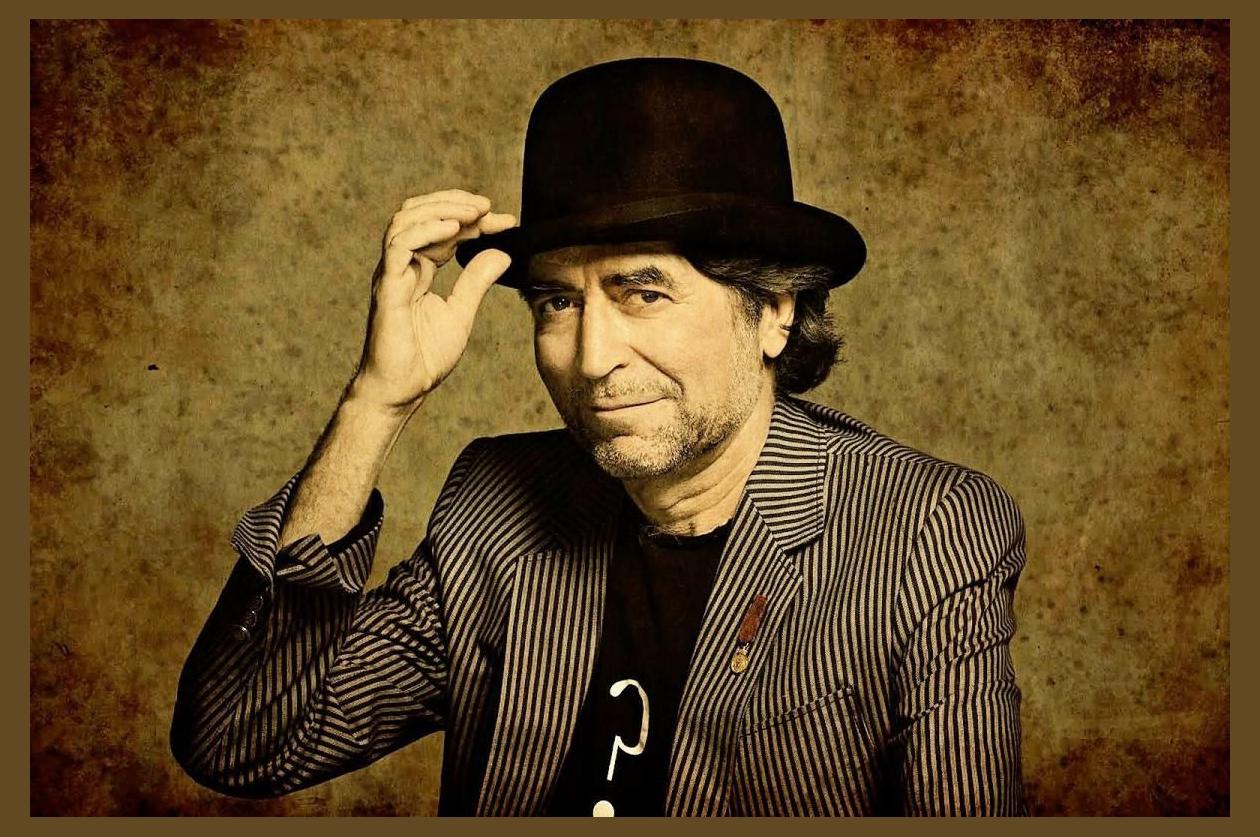 Joaquín Sabina
Joaquín Sabina
Joaquín Sabina: A Troubadour of Love, Protest, and Controversy
In the annals of Spanish music, Joaquín Sabina stands as an enigmatic and influential figure. Born in 1949 in Úbeda, Andalusia, Sabina's life and career have been marked by both artistic brilliance and personal turmoil.
Early Life and Influences:
Sabina's childhood was shaped by his father's love of poetry and music. He began writing at a young age, drawing inspiration from the works of Federico García Lorca and other literary giants. At the age of 18, he moved to Madrid to study philosophy and become a poet.
Musical Beginnings:
In the early 1970s, Sabina's musical career took off. He collaborated with other musicians and formed the band Viceversa. Their debut album, "Calle Melancolía" (1978), showcased Sabina's poetic lyrics and haunting melodies.
Solo Success and International Acclaim:
Sabina's solo career blossomed in the 1980s with the release of albums such as "Hotel, dulce hotel" (1987) and "El hombre del traje gris" (1989). His songs, filled with themes of love, loss, and social commentary, resonated with audiences worldwide.
"Contigo": A Timeless Ballad:
Among Sabina's most beloved songs is "Contigo," released in 1996. The song is a tender and evocative love ballad that captures the bittersweet longing and vulnerability of romantic relationships. It has become a timeless anthem for lovers and dreamers around the globe.
Challenges and Controversies:
Sabina's outspoken nature has often led to controversy. He faced censorship during the Franco dictatorship and has been criticized for his personal life and political views. In 2001, he suffered a stroke that nearly ended his career.
Discography:
Sabina's prolific career has resulted in over 20 studio albums, including:
* Calle Melancolía (1978)
* Hotel, dulce hotel (1987)
* El hombre del traje gris (1989)
* Física y química (1992)
* 19 días y 500 noches (1999)
* Alivio de luto (2005)
* Vinagre y rosas (2009)
Members:
Over the years, Joaquín Sabina has collaborated with numerous musicians, including:
* Pancho Varona (guitar, backing vocals)
* Antonio García de Diego (guitar, backing vocals)
* Jaime Asúa (piano, keyboards)
* Pedro Guerra (guitar, vocals)
Legacy and Impact:
Joaquín Sabina remains an enduring icon in Spanish music. His poetic lyrics, unforgettable melodies, and controversial persona have made him a beloved figure for generations. He has inspired countless musicians and his songs continue to captivate audiences worldwide.
In the annals of Spanish music, Joaquín Sabina stands as an enigmatic and influential figure. Born in 1949 in Úbeda, Andalusia, Sabina's life and career have been marked by both artistic brilliance and personal turmoil.
Early Life and Influences:
Sabina's childhood was shaped by his father's love of poetry and music. He began writing at a young age, drawing inspiration from the works of Federico García Lorca and other literary giants. At the age of 18, he moved to Madrid to study philosophy and become a poet.
Musical Beginnings:
In the early 1970s, Sabina's musical career took off. He collaborated with other musicians and formed the band Viceversa. Their debut album, "Calle Melancolía" (1978), showcased Sabina's poetic lyrics and haunting melodies.
Solo Success and International Acclaim:
Sabina's solo career blossomed in the 1980s with the release of albums such as "Hotel, dulce hotel" (1987) and "El hombre del traje gris" (1989). His songs, filled with themes of love, loss, and social commentary, resonated with audiences worldwide.
"Contigo": A Timeless Ballad:
Among Sabina's most beloved songs is "Contigo," released in 1996. The song is a tender and evocative love ballad that captures the bittersweet longing and vulnerability of romantic relationships. It has become a timeless anthem for lovers and dreamers around the globe.
Challenges and Controversies:
Sabina's outspoken nature has often led to controversy. He faced censorship during the Franco dictatorship and has been criticized for his personal life and political views. In 2001, he suffered a stroke that nearly ended his career.
Discography:
Sabina's prolific career has resulted in over 20 studio albums, including:
* Calle Melancolía (1978)
* Hotel, dulce hotel (1987)
* El hombre del traje gris (1989)
* Física y química (1992)
* 19 días y 500 noches (1999)
* Alivio de luto (2005)
* Vinagre y rosas (2009)
Members:
Over the years, Joaquín Sabina has collaborated with numerous musicians, including:
* Pancho Varona (guitar, backing vocals)
* Antonio García de Diego (guitar, backing vocals)
* Jaime Asúa (piano, keyboards)
* Pedro Guerra (guitar, vocals)
Legacy and Impact:
Joaquín Sabina remains an enduring icon in Spanish music. His poetic lyrics, unforgettable melodies, and controversial persona have made him a beloved figure for generations. He has inspired countless musicians and his songs continue to captivate audiences worldwide.